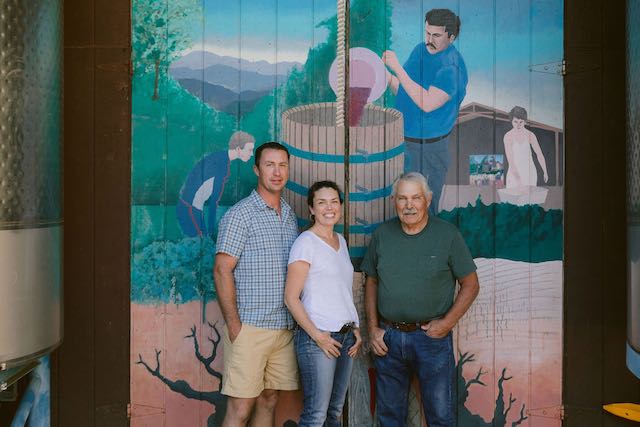JEFF QUACKENBUSH | THE NORTH BAY BUSINESS JOURNAL | September 12, 2023 |
Small wineries Smith-Madrone and Summit Lake have joined Hoopes Vineyard in its countersuit against Napa County over regulation of on-site marketing by vintners with permits that predate a three-decade-old landmark local law.
A nearly year-old legal battle between a local winery and Napa County over how it regulates older producers now has expanded to include two other small vintners.
The vintners have permits predating a 33-year-old landmark local law that defines what newer operations can do.
The county had sued Hoopes Vineyard near Yountville in October 2022, alleging it needs permission to host visitors for tastings and similar activities. The vintner countersued two months later, asking Napa County Superior Court to determine what’s allowed under the small-winery exemption in the 1990 Winery Definition Ordinance.
Hoopes, located near Yountville, also claimed county regulators were treating such small vintners differently than other producers and asserts they were infringing on activities allowed under state and federal licenses.
On Sept. 8, Smith-Madrone Vineyard and Winery on the western ridge of Napa Valley and Summit Lake Vineyards & Winery on the valley’s eastern mountains joined Hoopes’ action. The case tentatively is set to go to trial Oct. 30.
RELATED STORIES
“I feel like the small family business is harder and harder to keep afloat,” Heather Griffin, a partner in Summit Lake, told the Business Journal. “I feel like we’re all being elbowed out.”
A spokesperson said the county doesn’t comment on litigation in progress.
The ordinance, or the WDO, is part of a five-decade effort to preserve the character of California farmland and the Napa County wine business. The Legislature passed the Williamson Act in 1965, creating the conservation easement system that allows farmers to make long-term commitments for the land. The county Board of Supervisors in 1968 created the nation’s first agricultural preserve, now totaling over 38,000 acres.
Wineries were allowed in the agricultural preserve because they process locally harvested grapes, but an effort grew in the late 1980s to define “wineries” from facilities that were “really gift shops or restaurants,” according to a history compiled by trade group Napa County Grapegrowers.
The WDO came out of that effort, and it included provisions to recognize wineries with use permits issued before 1974, between 1974 and 1990, and those considered a “small winery.” The ordinance requires an application use-permit for expansion beyond a winery’s pre-WDO level.
The county estimates that 32 vintners fit the pre-WDO “small winery” category, with 28 of those operators still active.
After several years of debate about expansion of winery operations and allegations and legal actions over violations of existing permits, the county implemented a permit compliance program in early 2019. It offered to review and clean up permits for compliance.
Griffin’s father, Bob Brakesman, bought the 20-plus-acre property at 2000 Summit Lake Drive in 1971. The operation released its first commercial wine in 1978 and bonded the newly finished winery on the property in 1984, obtaining its small-winery use permit that year, according to the court filing. Today it produces about 2,000 cases of estate red wines a year, ranging from rose ($29 a bottle) to Howell Mountain cabernet sauvignon ($105), Griffin said.
Since 1985, Summit Lake has allowed guests to visit the property to sample and buy wine as well as picnic there, the legal filing said. In 2018, the winery considered expanding production and hired consultants to prepare an application for a “use permit of some kind,” the document said.
Between the 1984 use permit and the 2019 county compliance program, Summit Lake claims it hadn’t heard from the county about issues over visitation, the filing said. The winery said it received a county letter about “life safety issues” that had to be resolved before the use permit modification for increased production could be issued, and that “visitation” wasn’t allowed under the small-winery exemption.
In mid-2020 the winery dropped its request for production expansion, but the county said the permit remained incomplete. The winery said recognition of existing visits in the permit would have required a road upgrade, the cost of which “was prohibitive, and threatened the viability of the business that had been in operation for nearly forty years.”
At Smith-Madrone, 1971 also was the year general partner Stuart Smith purchased 200 acres at 4022 Spring Mountain Road, according to its court filing. In October 1973 a small-winery use permit was issued to produce up to 18,000 gallons, or 7,570 standard 9-liter cases annually.
The winery said it hasn’t heard from the county about problems about its operations, including hosting an unlimited number of “marketing events.”
“On just one occasion, in 1984, Smith-Madrone hosted a very visible ‘event’ for the Democratic National Convention, attended by members of the Napa County Board of Supervisors, and publicized in the San Francisco Chronicle,” the vintner’s filing said.
Representing Smith-Madrone and Summit Lake in the case are Katharine Falace of St. Helena law firm Buchalter and Lindsay Hoopes, a partner in that winery and a licensed attorney.


